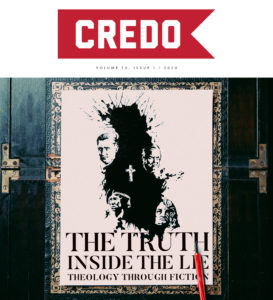
At the Feet of the Fake: What Fiction Can Teach Us About Theological Interpretation
 The new issue of Credo Magazine, “The Truth Inside the Lie,” focuses on the relationship between theology and fiction. The following is an excerpt from Ronni Kurtz’s column, “At the Feet of the Fake: What Fiction Can Teach Us About Theological Interpretation.” Ronni Kurtz is the Managing Editor of For The Church and also serves as the Assistant Director of Marketing at Midwestern Baptist Theological Seminary—where he is pursuing a Ph.D. in systematic theology. He also serves as Pastor of Teaching and Equipping at Emmaus Church. You can follow him on Twitter at @RonniKurtz.
The new issue of Credo Magazine, “The Truth Inside the Lie,” focuses on the relationship between theology and fiction. The following is an excerpt from Ronni Kurtz’s column, “At the Feet of the Fake: What Fiction Can Teach Us About Theological Interpretation.” Ronni Kurtz is the Managing Editor of For The Church and also serves as the Assistant Director of Marketing at Midwestern Baptist Theological Seminary—where he is pursuing a Ph.D. in systematic theology. He also serves as Pastor of Teaching and Equipping at Emmaus Church. You can follow him on Twitter at @RonniKurtz.
From the same pen which birthed the ever-important fictional town of Gilead, Iowa, came a collection of delightful essays entitled, When I Was a Child I Read Books. In one of these essays, the novelist Marilynne Robinson writes regarding the concept of “imaginative love” in which she describes the capacity for humans to feel genuine affection for those who are not really there. Using fictional characters, or real authors of the past as test-subjects, she stated, “I love the writers of my thousand books. It pleases me to think how astonished old Homer, whoever he was, would be to find his epics on the shelf of such an unimaginable being as myself, in the middle of an unrumored continent.” She concludes, “All together they are my community.”
The Teacher Who Is Not There
Those who have spent much time in the presence of well-crafted fictional characters need not be swayed by Robinson’s logic. For, the evidence of such a possibility resides in their deep inward adoration for their favorite characters. Those of us who find fiction as a well of joy are more than equipped to recite the real lessons we have learned at the feet of the fake. One of Dickens’s orphaned boys—Oliver Twist, David Copperfield, or Pip—may have taught us to adore the mundane; one of Rowling’s students, Longbottom perhaps, may have taught us the worthiness of bravery. These characters’ lives, in their entirety, find their full existence inside a few pages, but their instruction lives large within us. Those of us who find fiction as a well of joy are more than equipped to recite the real lessons we have learned at the feet of the fake. Click To Tweet
Fiction has the power to instruct all those who would dare dive into the world of the imaginative. She’s equipped to act as the schoolmaster on an endless assortment of topics; she knows lessons of love and heartbreak, hope and despair, fortune and loss, friendship and traitors, work and leisure, and the list could almost ever-flow. Fiction’s wisdom is as vast as her contributors and is increasing with each new page published. When one surveys the list of potential lessons taught from fictional literature, they may not suspect theological realities to be present, yet the theologian has much to learn from novels.
A Real Lesson From the Fake
The roads of fiction and theology cross at a number of intersections. However, the jurisdiction of this essay will be confined to a brief examination about the lesson fiction literature might teach us regarding the task of theological interpretation of Scripture. Even with this delineation, the points of contact between novels and theological interpretation proliferate. For who would doubt that well-crafted fiction has a lesson for theologians and theological interpretation when it comes to articulating plot development, or pursuing a robust understanding of character, or developing empathy with those caught in the drama, or visualizing interlocutors and antagonists. Yes, in this very incomplete list of reasons, the theologian has ample justification to crack open their next Jane Austen novel.
However, there is a benefit which exists at a more basic level about which the novelists or fiction reader can instruct the theologian. Namely, the novelist can instruct the theological reader about the inherit relationship between the ontology and functionality of a piece of literature.
*Read Ronni Kurtz’s entire column in the latest issue of Credo Magazine.
Photo credit: The Works of Charles Dickens, ActuaLitté

